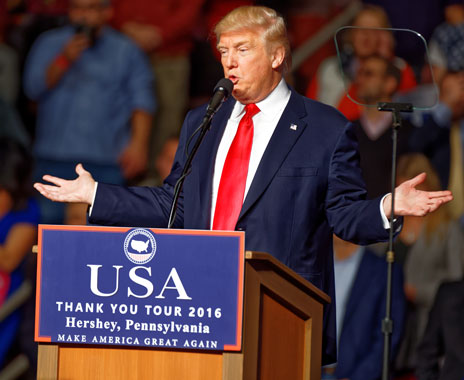President Donald Trump has had a contentious first 124 days in office, but the new administration has assured the restaurant industry that there is a “method to the madness,” according to an educational session hosted Tuesday at the National Restaurant Association (NRA) Show in Chicago.
While little of the president’s campaign promises have been implemented or addressed, operators and employees should expect changes to take place as he settles into the new role, said Cicely Simpson, executive vice president of policy and government affairs at the NRA.
“They think they’re making good progress, and expect the employer community to be behind them,” Simpson said during the educational session.
From healthcare to tax reform, here’s a look at how some of Trump’s potential legislative targets might affect the restaurant industry.
Immigration
While nothing has been done on the policy side addressing some of Trump’s promises on immigration—such as building a wall on the U.S.-Mexico border—deportations have been increasing across the country.
“If you’re seeing these deportations in your community, please call us,” Simpson said, adding that Immigration and Customs Enforcement Raids have affected the industry, with both restaurateurs and employees being deported.
All of the activity surrounding deportations and raids, along with the potential for tumultuous results, has led Congress to back off from immigration policymaking in the short term.
“This is a serious issue for the restaurant industry,” Simpson said. “We are an industry of diversity and inclusion.”
Tax Reform
It was one of Trump’s early campaign promises, but tax reform hasn’t been touched during his first 124 days. Still, conversations are ongoing in D.C. to make tax reform the next priority of the Trump administration.
One tax reform proposal that would be particularly impactful to restaurants is the border adjustment tax, which is intended to encourage U.S. production by giving tax breaks to companies that export goods and taxing imports.
Trump initially opposed the tax while House Republicans were in support, so its future remains uncertain. Tax reform may also hinge on the passage of Trump’s fiscal 2018 budget released Tuesday, which proposes to slash federal spending by $3.6 trillion over the next decade.
Overtime Rule
The overtime rule, which was approved last year under the Obama administration and increased the salary threshold at which overtime must be paid, remains in limbo pending court decisions, but has not been addressed by the new administration.
New labor secretary Alexander Acosta has expressed support for increasing the salary threshold from where it stands today ($24,000), but not to $47,476 as proposed by the Obama administration. A lower threshold would ease pressure on restaurant operators, who would have been forced to pay overtime to the majority of their employees under the Obama administration’s proposal.
Healthcare
The Trump administration may have poisoned the well by tackling healthcare so early on in the presidency instead of focusing on more amenable changes like infrastructure investments. “There’s so much ill will in Congress about starting with the healthcare law,” Simpson said.
The House narrowly passed the Affordable Care Act’s (ACA) replacement earlier this month, and the plan awaits a potential overhaul in the Senate. The latest version of the proposed plan would repeal the employer mandate, while also offering companies a universal tax credit.
Trump’s budget, which assumes the Medicaid portion of the plan will be passed, cuts Medicaid by $800 billion over the next decade while also reducing funding for food stamps, Children’s Health Insurance Program, Social Security Disability Insurance, and Temporary Assistance for Needy Families.



